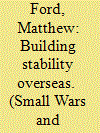| Srl | Item |
| 1 |
ID:
132268


|
|
|
|
|
| Publication |
2014.
|
| Summary/Abstract |
In 2011, the Department for International Development, the Foreign & Commonwealth Office, and the Ministry of Defence launched the Building Stability Overseas Strategy (BSOS). This document sought to integrate cross-government activity as it related to conflict and security so as to 'take fast, appropriate and effective action to prevent a crisis or stop it escalating and spreading'. At the heart of the strategy was the recognition that addressing instability and conflict overseas was morally right and in the UK's national interests. This confluence of foreign policy realism and ethical outlook most clearly found harmony in the acknowledgement that it was cheaper for the international community to avoid conflict than it was to try to manage it. Through an examination of three historical case studies (Uganda 1964-1972, Rhodesia-Zimbabwe 1979-1981, and Sierra Leone 2000-2007), this article seeks to demonstrate just how difficult this seemingly sensible strategic outlook is. In particular, the article shows there are historical parallels in British postcolonial history that very closely resemble contemporary policy choices; that these can be used to define what is different about past and present practice; and, which in turn, can be used to - at least tentatively - mark out the potential strengths and weaknesses in BSOS.
|
|
|
|
|
|
|
|
|
|
|
|
|
|
|
|
| 2 |
ID:
132280


|
|
|
|
|
| Publication |
2014.
|
| Summary/Abstract |
The use of conventional armed forces in a deterrent role merits close consideration. Instability in weak or failing states can have global ramifications, while efforts to build stability take time. In principle, conventional deterrence can be used to buy the time required for such stabilization efforts. Attempts at deterrence will, however, need to overcome credibility problems stemming from the technical limitations associated with conventional armed forces, and with the likely requirement for multiple external actors to deter multiple intrastate audiences. While deterrence might work under certain circumstances, it will not play as central a role in strategy as it did during the Cold War.
|
|
|
|
|
|
|
|
|
|
|
|
|
|
|
|
| 3 |
ID:
132225


|
|
|
|
|
| Publication |
2014.
|
| Summary/Abstract |
British attitudes towards military intervention following the campaigns in Iraq and Afghanistan have undergone what appears to be considerable change. Parliament has voted against the use of Britain's armed forces in Syria and the public are unenthused by overseas engagement. Conscious of the costs and the challenges posed by the use of British military power the government has been busy revamping the way it approaches crises overseas. The result is a set of policies that apparently heralds a new direction in foreign policy. This new direction is encapsulated in the Building Stability Overseas Strategy (BSOS) and the more recent International Defence Engagement Strategy (IDES). Both BSOS and IDES set out the basis for avoiding major deployments to overseas conflict and instead refocuses effort on defence diplomacy, working with and through overseas governments and partners, early warning, pre-conflict prevention and post-conflict reconstruction. Developing a number of themes that reach from across the Cold War to more contemporary discussions of British strategy, the goal of this special edition is to take into account a number of perspectives that place BSOS and IDES in their historical and strategic context. These papers suggest that using defence diplomacy is and will remain an extremely imprecise lever that needs to be carefully managed if it is to remain a democratically accountable tool of foreign policy.
|
|
|
|
|
|
|
|
|
|
|
|
|
|
|
|